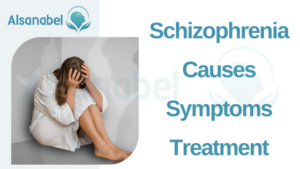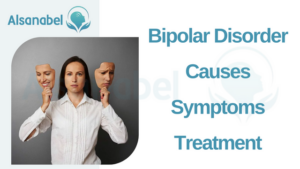How Schizophrenia Differs from Bipolar Disorder 2023
- Category antipsychotic medications
Understanding Schizophrenia and Bipolar Disorder
Schizophrenia and bipolar disorder are two distinct mental health conditions that can be commonly misunderstood. Schizophrenia is a chronic brain disorder that affects a person’s perception of reality, often characterized by hallucinations, delusions, and disorganized thinking. On the other hand, bipolar disorder is a mood disorder that is marked by extreme shifts in mood, energy, and activity levels, usually manifesting as episodes of mania and depression.
Differences in symptoms and patterns of onset
Symptoms:Schizophrenia primarily affects a person’s cognitive processes, leading to disruptions in thought, behavior, and emotional responses. Common symptoms include hallucinations, delusions, disorganized speech, and decreased motivation. Bipolar disorder, on the other hand, causes extreme mood swings that can range from manic episodes characterized by heightened energy, euphoria, and erratic behavior, to depressive episodes marked by sadness, low energy, and difficulty concentrating.
Patterns of onset:Schizophrenia typically appears in late adolescence or early adulthood, with gradual onset and a chronic course. It often starts with subtle changes in behavior and functioning, progressing to more severe symptoms over time. In contrast, bipolar disorder usually emerges in late adolescence or early adulthood but has a more episodic nature. Individuals with bipolar disorder typically experience cycles of mania and depression, with periods of relatively stable mood in between.
While both schizophrenia and bipolar disorder are serious mental health conditions that require proper diagnosis and treatment, understanding the key differences in their symptoms and patterns of onset is crucial for accurate identification and effective management of these disorders. Seek professional help if you or someone you know is experiencing symptoms related to either condition.
Schizophrenia: Causes, Symptoms, and Treatment

Causes and risk factors of Schizophrenia
Schizophrenia is a mental disorder characterized by abnormal thinking, perception, and behaviors. While the exact cause is still unknown, it is believed to be a combination of genetic, environmental, and chemical factors. Some risk factors that increase the likelihood of developing schizophrenia include a family history of the disorder, exposure to certain viruses or malnutrition during pregnancy, and high levels of stress during childhood.
Symptoms and manifestations of Schizophrenia
The symptoms of schizophrenia can vary from person to person, but commonly include hallucinations (seeing or hearing things that are not there), delusions (false beliefs or thoughts), disorganized thinking and speech, and lack of motivation or interest in daily activities. These symptoms typically appear in late adolescence or early adulthood and can significantly impair a person’s ability to function in society.
Treatment options and management strategies
While there is no cure for schizophrenia, it can be effectively managed with a combination of medication, therapy, and support services. Antipsychotic medications help to alleviate the symptoms of the disorder by regulating brain chemicals. Therapy, such as cognitive-behavioral therapy, can help individuals with schizophrenia to better cope with their symptoms and improve their quality of life. Additionally, support services such as vocational training and community support groups can provide assistance and enhance social integration for individuals living with schizophrenia.
In conclusion, schizophrenia is a complex mental disorder with a wide range of symptoms and manifestations. It is important to seek professional help if you or someone you know is experiencing symptoms of schizophrenia. With proper treatment and support, individuals living with schizophrenia can lead fulfilling and productive
Read more:
Fully detail about schizophrenia in Qatar
Bipolar Disorder: Causes, Symptoms, and Treatment

Causes and risk factors of Bipolar Disorder
Bipolar disorder is a mental illness that affects millions of people worldwide. While the exact cause of bipolar disorder is unknown, researchers believe that a combination of genetic, biological, and environmental factors play a role in its development. Some risk factors for bipolar disorder include a family history of the disorder, periods of high stress, substance abuse, and certain brain structure differences. Understanding the causes and risk factors can help individuals seek proper treatment and support for their condition.
Symptoms and characteristics of Bipolar Disorder
Bipolar disorder is characterized by extreme shifts in mood and energy levels. There are two main phases in bipolar disorder: the manic phase and the depressive phase. During the manic phase, individuals may experience elevated mood, increased energy, racing thoughts, and impulsive behaviors. In the depressive phase, individuals may feel sadness, loss of interest, fatigue, and thoughts of suicide. Identifying these symptoms is crucial for an accurate diagnosis and effective treatment.
Different types of Bipolar Disorder and their treatment approaches
There are several types of bipolar disorder, including bipolar I, bipolar II, and cyclothymic disorder. Each type has its own unique set of symptoms and treatment approaches. Bipolar I disorder is characterized by severe manic episodes that may require hospitalization, while bipolar II disorder involves milder manic episodes (known as hypomania) and more pronounced depressive episodes. Cyclothymic disorder is a milder form of bipolar disorder with less severe mood swings. Treatment for bipolar disorder often includes a combination of medication, therapy, and lifestyle changes to help manage symptoms and promote stability.
Understanding the differences between bipolar disorder and other mental health conditions, such as schizophrenia, is important for accurate diagnosis and appropriate treatment. While both conditions involve changes in mood and affect daily functioning, they have distinct symptoms and require tailored treatment approaches. Seeking professional help and support is crucial for individuals experiencing symptoms of bipolar disorder or any other mental health concern.
Read more:
The effect of exercise on bipolar disorder 2023
Comparing Schizophrenia and Bipolar Disorder
Key differences in symptom presentation and severity
While both schizophrenia and bipolar disorder are mental health conditions that can significantly impact a person’s life, they differ in terms of symptom presentation and severity.
Schizophrenia is characterized by psychosis, which includes hallucinations and delusions. Individuals with schizophrenia often experience a disconnect from reality and may have disorganized thinking and speech. On the other hand, bipolar disorder primarily involves mood swings, with individuals experiencing episodes of mania and depression.
Differentiating factors in diagnostic criteria
The diagnostic criteria for schizophrenia and bipolar disorder also vary. Schizophrenia is typically diagnosed based on the presence of specific symptoms, such as hallucinations, delusions, and disorganized behavior. These symptoms must persist for a significant period and cause impairment in social or occupational functioning.
In contrast, bipolar disorder is diagnosed when individuals experience periods of abnormally elevated mood (mania) alternating with periods of depression. The presence of these distinct mood episodes is essential for diagnosis, along with other symptoms like reduced need for sleep, increased energy, and impulsivity.
Distinct treatment approaches for each disorder
Given the differences in symptomatology, treatment approaches for schizophrenia and bipolar disorder vary as well. Schizophrenia is usually managed with antipsychotic medications to reduce hallucinations and delusions. Additional psychosocial interventions, such as counseling and social support, may also be recommended.
In contrast, bipolar disorder is commonly treated with mood stabilizers to help regulate mood swings and prevent episodes of mania or depression. Additionally, psychotherapy and lifestyle modifications, including regular sleep patterns and stress management, are often part of the treatment plan for individuals with bipolar disorder.
Understanding these key differences between schizophrenia and bipolar disorder is crucial for accurate diagnosis and effective management of these mental health conditions.
Managing Schizophrenia and Bipolar Disorder

Life with Schizophrenia: Coping mechanisms and support systems
Living with schizophrenia can be challenging, but with the right coping mechanisms and support systems, it is possible to lead a fulfilling life. People with schizophrenia often benefit from a combination of medication, therapy, and lifestyle changes. Support from family, friends, and support groups can also play a crucial role in managing the symptoms and providing a sense of community. Education and understanding about the condition are key, as it helps individuals and their loved ones navigate the complexities of schizophrenia and seek appropriate help when needed.
Life with Bipolar Disorder: Coping mechanisms and support systems
Managing bipolar disorder involves developing coping mechanisms to navigate the highs and lows of this condition. Medication is typically prescribed to help stabilize mood swings, while therapy can assist in developing strategies to manage triggers and maintain emotional balance. Support networks, such as support groups or online communities, can provide a valuable source of understanding and encouragement for individuals with bipolar disorder. Lifestyle changes, including maintaining a regular sleep schedule and engaging in stress-relieving activities, are also important in managing the condition.
Similarities and differences in managing daily challenges
While both schizophrenia and bipolar disorder are mental health conditions that require ongoing management, there are some key differences in how they are treated. Schizophrenia primarily involves managing hallucinations, delusions, and disorganized thinking, while bipolar disorder focuses on regulating mood swings. Both conditions benefit from a combination of medications, therapy, and support systems, but the specific treatment approaches may vary. It is important for individuals with either condition to work closely with healthcare professionals to develop a personalized treatment plan that addresses their unique needs.
In conclusion, managing schizophrenia and bipolar disorder involves a combination of medication, therapy, lifestyle changes, and support systems. With the right tools and support, individuals with these conditions can lead fulfilling lives and effectively manage their symptoms.
Understanding the unique nature of Schizophrenia and Bipolar Disorder
Schizophrenia and Bipolar Disorder are two distinct mental health conditions that have specific characteristics and symptoms. It is important to fully understand the differences between the two to seek accurate diagnosis and appropriate treatment options.
Understanding the unique nature of Schizophrenia and Bipolar Disorder
Schizophrenia:Schizophrenia is a chronic and severe mental disorder characterized by disturbances in perception, thoughts, emotions, and behavior. It often involves experiencing hallucinations, delusions, disorganized speech, and cognitive impairments. The onset of symptoms typically occurs in late adolescence or early adulthood.
Bipolar Disorder:Bipolar Disorder, also known as manic-depressive illness, is a mood disorder characterized by extreme mood swings. Individuals with Bipolar Disorder experience episodes of mania, which are periods of elevated mood and increased energy, followed by episodes of depression. These mood swings can significantly impact daily functioning and relationships.
Seeking accurate diagnosis and appropriate treatment options
Accurate Diagnosis:It is crucial to consult a healthcare professional for an accurate diagnosis if you suspect you or a loved one may be experiencing symptoms of Schizophrenia or Bipolar Disorder. A proper evaluation by a psychiatrist or psychologist can help determine the appropriate diagnosis and ensure the right treatment plan.
Treatment Options:Treatment for Schizophrenia and Bipolar Disorder often involves a combination of medication, therapy, and psychosocial support. Each condition requires specific treatment strategies tailored to individual needs. It is important to work closely with healthcare professionals to develop a comprehensive treatment plan.
Frequently Asked Questions
Here are some commonly asked questions about Schizophrenia and Bipolar Disorder:
- Can Schizophrenia and Bipolar Disorder coexist in the same individual?
Yes, it is possible for an individual to have both Schizophrenia and Bipolar Disorder. This is known as schizoaffective disorder. - What are the risk factors for developing Schizophrenia and Bipolar Disorder?
The exact causes of these disorders are not known, but factors such as genetics, brain chemistry, and environmental factors may contribute. - Can Schizophrenia and Bipolar Disorder be cured? While there is no known cure for Schizophrenia or Bipolar Disorder, effective treatment can help manage symptoms and improve the quality of life.
- How can I support someone with Schizophrenia or Bipolar Disorder? Providing emotional support, encouraging medication adherence, and educating yourself about the conditions are important ways to support individuals with these disorders.
In conclusion, understanding the unique nature of Schizophrenia and Bipolar Disorder is essential for accurate diagnosis and appropriate treatment. Seeking professional help and support is crucial for managing symptoms and improving overall well-being.









